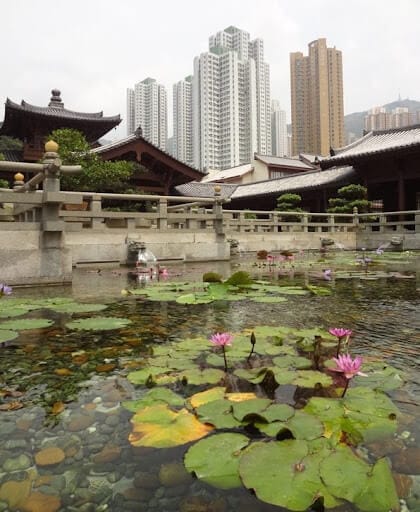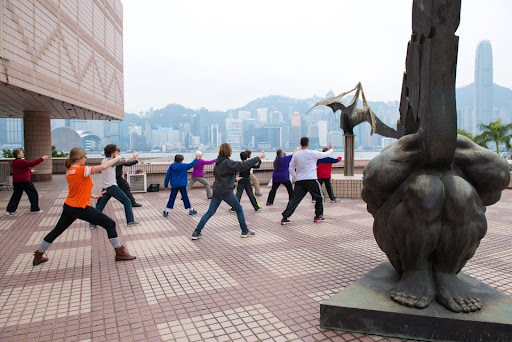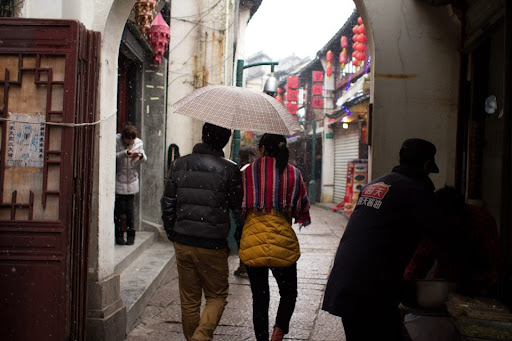Study Abroad Destination
Hong Kong
Encounter the past, present, and future in South China.
A Modern Global Community
Under British rule from 1841 until 1997, the powerful financial hub of Hong Kong is dotted with remnants of its colonial past. Semester at Sea voyagers encounter traditional Chinese customs, British architecture, Japanese cuisine, and the highest number of skyscrapers in the world.

Hong Kong Overview
Why Hong Kong?

For many Western travelers, China is quite literally a world away. During our stay, Semester at Sea voyagers have a unique opportunity to experience the many sides of Hong Kong: past and present, natural and manmade, by sea, land, and sky — skyscraper, that is.
Popular highlights include:
- Visiting monuments, heritage buildings, and historical sites
- Taking in views of the city from Victoria Peak
- Learning from and practicing with a tai chi master
- Hiking the scenic Dragon’s Back Trail
- Tasting tea in a traditional-style tea house
- Immersing yourself in pop culture at the Avenue of Stars
The in-country excursions provided by SAS staff and local guides offer a chance to take in a wide range of attractions without needing to handle logistics.
Semester at Sea
Semester at Sea Hong Kong Experience
Once anchored in the Port of Hong Kong, voyagers will have their choice of Field Programs that focus on local commerce, religious customs, unique abodes, and more. Voyagers get to explore:
- Man Mo Temple, the oldest temple in the city
- Yuen Po Street Bird Garden, Flower Market, and Jade Market
- Aberdeen, a waterborne village made entirely of fishing boats
Each Semester at Sea stop in Hong Kong lasts only about five or six days, but it’s plenty of time to sample multiple facets of this dynamic global city.

Hong Kong, China
Voyager Travel Tips

Travel Tips for Hong Kong Port of Call
Every destination and port of call is unique, and each carries its own set of circumstances and expectations for travelers. Our top priority is the health and safety of our voyagers — we want all program participants to be as informed as possible so they can enjoy each port experience to the fullest.
Please be advised that the tips below provide a general overview of travel considerations and are not intended to dissuade voyagers from experiencing this unforgettable destination.
Official taxis in Hong Kong are two-tone sedans with fare meters. Traffic is heavily congested, so factor in extra travel time when using a taxi service. Public buses are also available, and regional travel is possible via the Mass Transit Railway (MTR).
Ship ID and passport (if flying to another city, staying in a hotel, or exchanging money in the bank).
Hong Kong has a subtropical climate, with weather ranging from wet and mild to warm and humid. Tropical cyclones are a concern for about half the year (May–November), as are typhoons and flooding due to heavy rain.
The official currency of Hong Kong is the Hong Kong dollar (HK$). Most businesses accept all major credit cards. Foreign currencies can be easily exchanged at banks, bureau de change, and hotels, and ATMs are widely available. Be aware of counterfeit Chinese currency; try to understand the signatures of authentic currency, and do not exchange money with individuals on the street. Tipping is customary — a 10% service charge is usually added to hotel and restaurant bills, and taxi drivers expect passengers to round up the fare to the nearest dollar.
China is relatively safe; however, as in many urban centers, crimes such as scams, pickpocketing, and petty theft are common in crowded tourist areas. Pedestrians share the sidewalks with motorbikes, bicycles, and cars, so be very aware when walking. Beware when purchasing goods or souvenirs in China, as counterfeit products are readily available and illegal to import into many countries.
Tap water in Hong Kong is typically not suitable for drinking, freezing, or brushing your teeth — bottled water is recommended. Air pollution routinely exceeds recommended thresholds in urban areas in China, so wearing N95 masks or similar is encouraged.
The primary method of contacting SAS staff is via phone or text. Avoid using open WiFi internet connections due to the high risk of cyber theft.
All voyagers receive contact information for local police, fire, ambulance, medical emergency services, and the U.S. embassy and consulate.